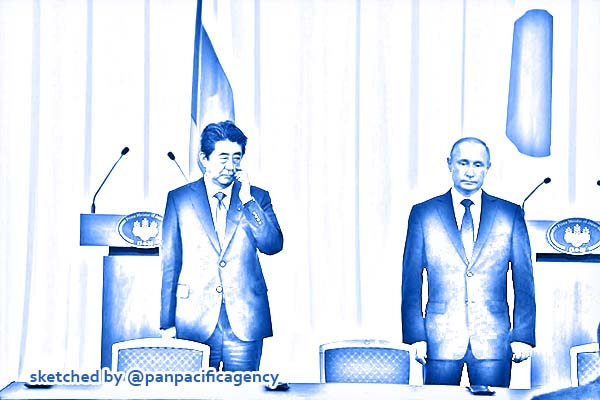Abe, Putin make little progress on territorial dispute

Japanese Prime Minister Shinzo Abe and Russian President Vladimir Putin meet after the G20 Summit in Osaka on Saturday. Photo: Yuri Kadobnov/Pool via REUTERS. Sketched by the Pan Pacific Agency.
OSAKA, Jun 30, 2019, Kyodo. Japanese Prime Minister Shinzo Abe made little headway in resolving a long-standing territorial dispute in talks Saturday with Russian President Vladimir Putin, with the two agreeing to have their governments continue negotiations, reported the Japan Today.
Their failure to find common ground means the signing of a formal peace treaty more than 70 years after World War II is still not in sight, though they agreed in the meantime to move ahead with plans to conduct joint economic activities on four Russian-held islands straddling the Pacific Ocean and the Sea of Okhotsk.
“It will not be easy to reconcile our differences, but it is becoming clearer what the issues we need to overcome are,” Abe said at a joint press briefing, adding that the negotiations would continue to be based on a key 1956 joint declaration.
“President Putin and I understand more than anyone the strategic importance of Japan-Russia relations, and that signing a peace treaty will serve to greatly strengthen those ties,” he added.
“Much work needs to be done to take Russia-Japan relations to the next level,” Putin said. “But this will set the stage to resolve the most difficult issues we are facing in a mutually acceptable manner.”
He added that he looks forward to Abe attending an economic forum that will be held Sept 4-6 in Vladivostok, where the two could hold another bilateral meeting.
The meeting, their first since Abe visited Moscow in January, took place after leaders from the Group of 20 major economies wrapped up a two-day summit in Osaka. The two also held expanded talks over dinner.
The 1956 joint declaration, under which Japan and the Soviet Union re-established diplomatic ties, mentions Moscow handing over the two smaller islands — Shikotan and the Habomai islet group — to Tokyo.
Eager for a diplomatic achievement ahead of a parliamentary election next month, Abe had been hoping to convince Putin to sign a basic agreement making good on that promise at Saturday’s meeting.
But Abe was forced to give up on that game plan after Moscow took a more hardline stance than expected, Japanese government sources have said.
Switching gears, Abe has sought to focus on economic programs in five areas — aquaculture, greenhouse farming, tourism, wind power and waste reduction — that the two countries are looking to conduct together on the islands.
The two leaders said their governments were looking to begin pilot programs in two of those fields — tourism and waste reduction — as early as this fall.
“There is a lot of work going into starting these programs,” Abe said, adding that their governments are working to resolve the remaining legal hurdles.
The Soviet Union seized the islands after Japan’s surrender in the war in 1945. Moscow maintains that its acquisition of the islands was legitimate, and the dispute has prevented the signing of a formal peace treaty.
Abe and Putin also discussed recent developments concerning North Korea and the Middle East.
Putin, who met with North Korean leader Kim Jong Un in April, said he and Abe agreed that the denuclearization of the Korean Peninsula can only be achieved through “peaceful and diplomatic means” and that “constructive and involved dialogue among all parties is necessary.”
They also exchanged views on Iran, which Abe visited earlier this month in a bid to ease tensions between the United States, a Japanese official said.